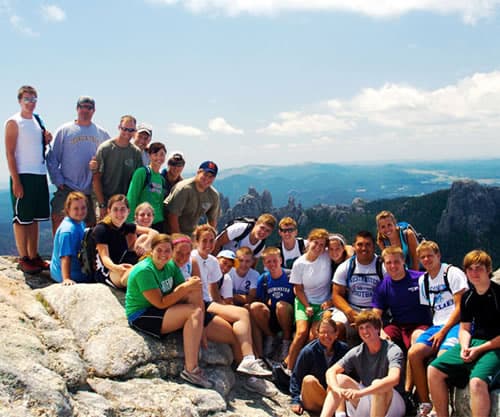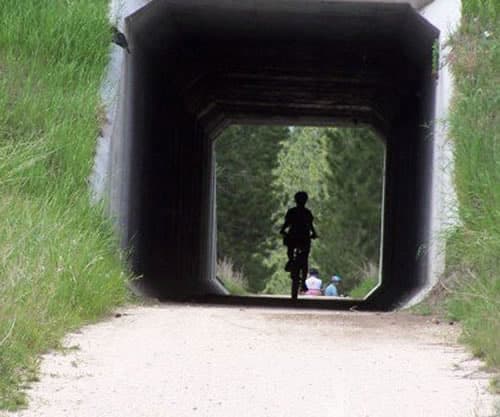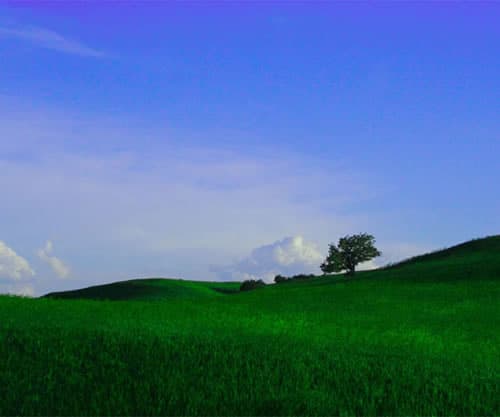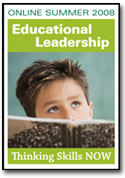My classroom has little slits for windows; narrow, horizontal panes at the back of the room let in a small amount of light, and two vertical rectangles at the far ends offer a glimpse of the outside world. Even though I cover my walls with posters of mountains, forests, and beaches, the room feels gray and colorless.
It is in this environment that we want our students to learn to celebrate the wonder of creation and study the complexities of the sciences. We want them to not only understand history and literature but also apply those lessons to their own lives, and we prod them to write imaginatively in a setting with little scope for the imagination.
Each summer, however, three other teachers and I have the privilege of escaping this artificial environment. During these summer sessions, when the prairie is our classroom and the campfire is the discussion forum, we can teach and our students can learn in a way I have rarely seen anywhere else.

Photo by Alex Docekal
Students and faculty from Westminster Christian Academy make the mountains their classroom.
The Course
For the past four years, approximately 25 students in the Summer Seminar in the Liberal Arts at Westminster Christian Academy, a private suburban high school in St. Louis, Missouri, have spent 12 days learning outside the school. We devote two hours of each day to instruction. These sessions, which we callcores, include reading, writing, lecture, and class discussion. Our content is cross-curricular: We cover philosophy, history, science, literature, and ethics. The curriculum is challenging, and we expect a high caliber of thought, discussion, and reflective writing. Students receive a semester's elective credit, and assessment is based on both group and individual participation as well as written assignments.
Each day also includes strenuous physical activity, such as hiking, biking, or kayaking, always in a beautiful place, our favorite region being the Badlands, Black Hills, and rivers of South Dakota. We camp in remote and often primitive sites, cook our own food, and hire an outfitting guide when necessary.
Challenging the Mind, Body, and Heart
Our seminar engages the whole child. It is more than a class of the mind; we demand physical activity. It is, however, more than a sports camp; we ask students to engage with difficult academic content. Many students have encountered nature at summer camps or with their families, but this is different because we demand reflection, thought, and participation. Finally, many outdoor programs recruit at-risk or troubled students in the hopes of instilling in them humility and confidence. Our program, in contrast, takes successful students and helps them become even better academically, physically, socially, and emotionally.

Photo by Alex Docekal
Biking is among the physical activities students participate in during the Summer Seminar.
On a typical trip, we start the teaching on the tall grass prairie at Wounded Knee in South Dakota. Students read eyewitness accounts of the brutal 1890 slaughter of the Lakota Sioux on the exact spot where it occurred. Traveling through the Cheyenne River Indian Reservation, home of four Lakota Sioux tribes and a community with one of the lowest per capita incomes in the United States, our students can see for themselves the result of U.S. government policy and decades of institutional racism. (See <XREF TARGET="reflectionswk">Student Reflections on Wounded Knee</XREF>.)
<P ID="heyse">In a science core, the biology teacher chides us for viewing the earth as expendable and exploitable. He calls us to actions of restoration that would show we cherish all things created. Students learn of one possible route to restoration at a buffalo ranch, a fertile island of good, green prairie in the midst of thousands of acres of lifeless, starved, and desolate grasslands. Our guest lecturer,buffalo rancher Dan O'Brien tells us that what cattle did to destroy the prairie, buffalo can do to restore it. He treats his buffalo with dignity, living out the principles we have been discussing in theory. (See <XREF TARGET="reflectionsbr">Student Reflections on the Buffalo Ranch</XREF>.)
<P ID="heyse2">As the days progress, students read such works as"<EMPH TYPE="4">A World Split Apart" by Alexander Solzhenitsyn, the Gettysburg Address by Abraham Lincoln, and Pollution and the Death of Man by Francis Schaeffer (Tyndale House, 1970). We ask students to apply lessons from the reading material to their own lives, to ask themselves how they can live differently. A key to the success of the seminar is the ample time we grant for reflection. Cores in English and in ethics require students to answer directed questions in their journals. The samples of student work that accompany this article reveal that students were thinking deeply about the content presented. (See <XREF TARGET="writingsamples">Student Writing Samples</XREF>.)
Making It Happen
A summer program like this may sound great, but there are a lot of practical matters to consider before beginning. These are a few principles we have found helpful.
Flexibility
Living in primitive campsites can be wonderful. In these isolated sites, students have marveled at the number of the stars, listened to the howl of coyotes, and realized, to their surprise, that they can manage without e-mail. However, weather can be a challenge. It is miserable trying to cook spaghetti over a camp stove in a thunderstorm. On one of our trips, the campground toilets were closed for two days because electricity was out. Leaders must be willing to let plans go awry and prepared to adjust schedules as needed.
Compatibility
Our students apply for the program, and we always have more applicants than spots. Although we have a long list of criteria, such as academic success and good behavior, the biggest factor in our selection is each student's ability to work with others. We'll choose a cheerful, helpful, pleasant B student over a whiny or arrogant A+ student any day.
Pace
For our first trips, we tried to teach too much, and we planned far too much for each day. Now, on the day we cycle 40 miles, we don't assign 30 pages of reading. We save our heartier lectures for days of less strenuous exercise. By the end of the trip, students are tired, so they are less able to focus on long lectures or reading assignments. These last days are the perfect time to emphasize reflective writing and group discussion.
Leadership
Although all four teachers on the trip are colleagues, one teacher needs to be in charge. The other teachers need to be willing to give input and then yield to any last-minute decisions the lead teacher must make about logistics, curriculum, and other matters.
On the flip side, the lead teacher shouldn't be domineering and controlling. It's good to have someone in charge who will make the last-minute decisions; it's also important that the lead teacher be flexible and collaborative.
Community
Letting students build their own community is pivotal. Year after year, students have commented that they appreciate being able to move outside their usual cliques and relate to students with whom they had previously never spent time. Routinely, the entire group stays up late around a campfire without dividing into groups or cliques, simply enjoying one another's company. As adults, we have intentionally stayed out of managing these developing relationships, outside of assigning a few directed journal questions.
Supervision
Because we have been in the enviable position of having more applicants than available spots, we have also been able to ward off discipline problems. Although we are on guard, as of yet we have had no significant behavior problems. Students do sign a statement of appropriate behavior before the trip. Our expectation level is high, but so is our trust level; we don't hover over kids, eavesdrop on conversations, or go through luggage. If serious issues do arise, the students involved will be sent home at their parents' expense.
On this issue, compatibility among staff is also crucial: A teacher who wants to assert more control, for example, might find our more low-key approach difficult.
Growing Whole Children
As I watch kids write intensely and vigorously in their journals, I can hear the meadowlarks singing in the long grasses of the prairie and a buffalo snorting over a faraway ridge. As the sun rises high, I take delight in the pure beauty of the prairie. But I take even greater delight in watching the students transform into thinkers before my eyes.

Photo by Justin Beasley
The tall grasses of the prairie are among the many sights that stimulate students' thinking.
In faculty lounges all across the country, teachers regularly complain that kids have lost the love of learning. When reading works of Carl Sagan in front of a waterfall, or Solzhenitsyn on a hiking trail, or Huxley on a beach, our students learn for learning's sake, ask questions of their own, and think for the pure joy of thinking. Imagine the possibilities: students asking questions because the history content matters, because journal writing isn't just about filling a class period but about exploring a powerful idea. These are the hallmarks of good teaching and learning—this is what it means to grow whole children.

